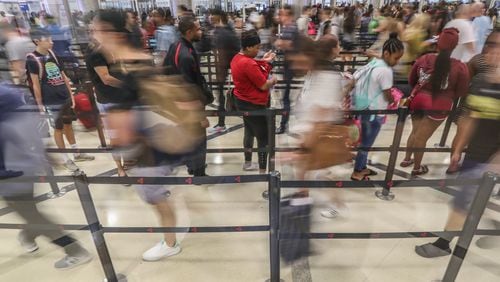Atlanta largely has avoided the resurgence of measles.
One threat could change that: the world’s busiest airport.
That was enough to land Clayton County among the 25 U.S. counties with the highest risk of an outbreak, according to a study published Thursday in The Lancet Infectious Diseases, a peer-reviewed medical journal. Clayton, home to Hartsfield-Jackson International, ranked 21st.
Researchers at The University of Texas at Austin and Johns Hopkins University based their rankings on two factors: volume of international travel from foreign countries with large measles outbreaks, and the prevalence of non-medical exemptions from childhood vaccinations.
The three counties with the greatest risk were Cook County in Illinois, Los Angeles County in California and Miami-Dade County in Florida, according to the study.
Since January there have been more than 750 confirmed measles cases in 23 states, nearly double the number last year, according to the Centers for Disease Control and Prevention. This year’s tally is already the highest number reported since the virus was declared eliminated in the U.S. in 2000.
Most of the cases are linked to international travel. That’s when an unvaccinated traveler brings the virus back to the U.S. from countries with ongoing outbreaks, and then exposes the virus to people who are not vaccinated.
The surge is primarily the result of a few large outbreaks in Washington state and New York, according to the CDC. There have been only six reported cases in Georgia – three family members in two separate families. None were vaccinated. And none live in Clayton County.
Georgia’s vaccination rates are relatively high, even though the state allows exemptions for medical or religious reasons. A CDC analysis of a national 2017 immunization survey found 1.3% of children born in 2015 had not received any recommended vaccination, up from 0.9% in 2011. In Georgia, an estimated 0.8% of children under three years of age have not had any vaccinations.
But 300,000 passengers pass through Hartsfield-Jackson every day. That includes travelers from Brazil, Israel, Japan, Philippines and Ukraine, five countries for which the CDC has issued travel notices for measles outbreaks. The Atlanta-based agency estimates 10 million people around the world get measles each year, and about 110,000 die from it.
U.S. Customs and Border Protection, responsible for security at Hartsfield-Jackson, said Thursday it has closely coordinated policies and procedures with the CDC at all ports of entry. It said CBP personnel review all travelers entering the U.S. for “overt signs of illness,” including visual observation, questioning and notifying the CDC as appropriate.
Measles can be contagious four days before a rash appears, though, making it difficult for an observer to distinguish the illness from a cold or allergies.
The virus is spread in the air through coughing and sneezing. It usually starts with fever, runny nose, cough, red eyes and sore throat. It is so contagious that an unvaccinated person can get measles just by being in a room where a person with measles has been, even up to two hours after that person has left, according to the CDC.
The CDC is sometimes notified about a sick traveler while a plane is still in the air, although the agency and its partners typically learn about the illness after a flight. For example, someone ends up in a hospital with the measles and a health care provider determines from a patient’s travel history that other flight passengers may have been at risk. That’s when health authorities work to track down where the patient has been and who needs to be notified and screened.
MORE: Georgia's three new cases part of a spike in measles across the country
Hartsfield-Jackson is one of 20 U.S. ports of entry with quarantine stations which are staffed with medical and public health officers from CDC.
A record 81 flights in the U.S. were investigated in 2018 for carrying at least one person contagious with measles, up from 15 investigations in 2017 and 10 in 2016, according to the CDC. Of the 106 aircraft, 66 were on domestic routes and the rest were inbound from foreign airports. The CDC didn't provide numbers for individual airports.
Clayton County referred questions to the CDC.
Sahotra Sarkar, lead author of the Lancet study and a University of Texas professor, is calling for a Yellow Card, an international certificate of vaccination, to be required for entry into the U.S. for travelers from countries with measles outbreaks.
A CDC spokesperson said the agency is not considering the yellow card at this time.
The study’s authors warned the most at-risk areas that have yet to report a case are those near international airports, such as Travis County in Texas, Honolulu County, Salt Lake County and multiple counties in Florida.
Measles can cause severe complications, including pneumonia and encephalitis, or swelling of the brain. For every 1,000 children who get measles, one or two will die from it, according to the CDC.
A recent CDC report indicates there have been at least two dozen cases of pneumonia, but no deaths, so far this year among those sickened in the U.S. with measles.
MORE DETAILS
The number of measles cases reported this year in the United States has reached 764, according to the latest report this week from the Centers for Disease Control and Prevention. Six of those cases are in Georgia.








